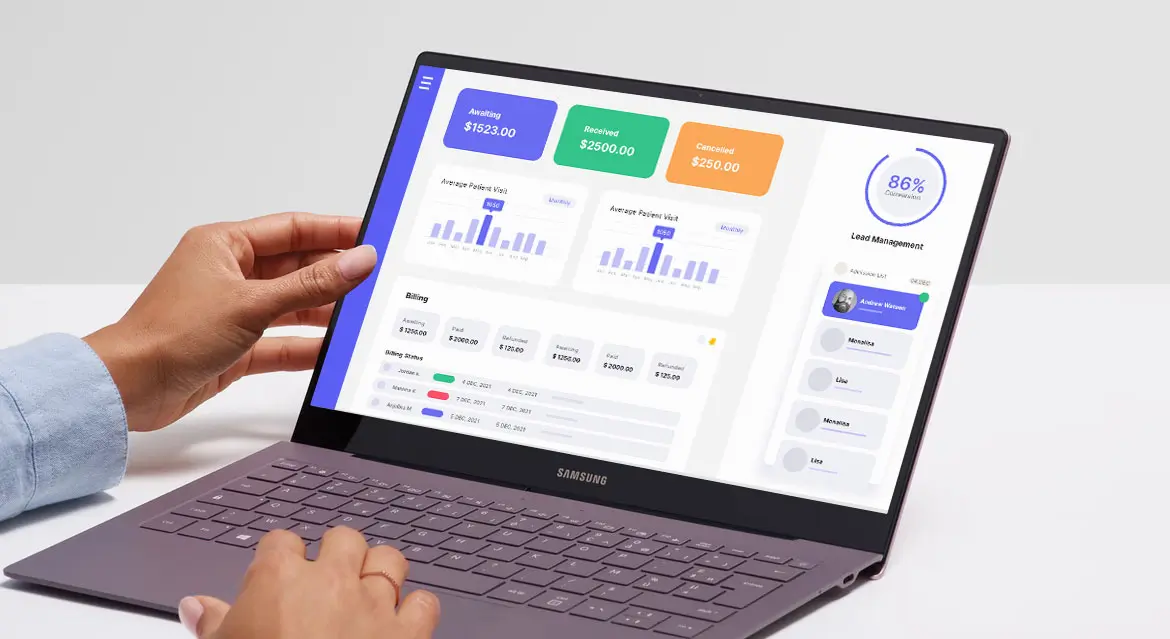Digital Hospital Management System
When it comes to safeguarding the health and well-being of communities, hospitals are an extremely important institution. Considering the tremendous pace of digital transformation that we are currently experiencing, it is more important than ever before for healthcare institutions to implement technology-driven solutions. The use of a digital hospital management system (HMS) provides hospitals with a comprehensive platform that allows them to increase overall efficiency, streamline their operations, and provide better care to their patients. In this article, we will investigate the reasons why hospitals require a digital hospital management system, focusing on the ways in which such systems contribute to a healthcare environment that is safer, more efficient, and more expedient.
What Is A Digital Hospital Management System ?
A Digital Hospital Management System (HMS) is a software solution designed to manage the comprehensive operations of a hospital or healthcare institution digitally. It centralizes, automates, and organizes various administrative, clinical, and financial tasks involved in running a hospital. By streamlining tasks and connecting all departments, an HMS improves the overall efficiency, quality of patient care, and security of sensitive data within a hospital.
The system serves as an integrated platform that connects hospital departments like reception, admissions, pharmacy, laboratory, billing, and human resources, allowing information to flow seamlessly across them. This improves coordination between departments, making it easier for staff to access real-time information and provide timely patient care.
Enhancing Patient Care with Digital Systems
The primary goal of any healthcare institution is to provide the best possible care to patients. A digital hospital management system serves as a centralized platform that integrates patient information across various departments. This integration means that healthcare providers can access a patient’s complete medical history, previous diagnoses, medication history, and test results in real-time. As a result, doctors and nurses are better equipped to make accurate diagnoses and develop personalized treatment plans.
Moreover, digital systems minimize human error. In a traditional paper-based system, there is always a risk of misplaced files, unreadable handwriting, or other issues that can lead to mistakes in patient care. A digital HMS reduces these risks by ensuring that all information is accurately recorded, securely stored, and readily accessible to authorized personnel. This ultimately leads to better patient outcomes, as providers have all the information they need at their fingertips.

Streamlining Hospital Operations for Increased Efficiency
One of the most significant advantages of a digital HMS is the ability to streamline hospital operations. Hospitals are complex institutions with multiple departments, each with its own set of responsibilities. Coordinating between departments can be a challenging and time-consuming task. A digital HMS brings all departments onto a single platform, allowing for seamless communication and coordination.
For instance, if a doctor requests a particular test for a patient, the request can be immediately sent to the laboratory department, and the results can be uploaded to the system once ready. This reduces delays and ensures that the patient receives the necessary care promptly. Additionally, the HMS can automate various administrative tasks such as scheduling, billing, and inventory management, further increasing efficiency and allowing staff to focus on patient care rather than administrative duties.
A digital HMS also enables hospital administrators to monitor and optimize resource allocation. By analysing data from the system, administrators can identify bottlenecks, adjust staffing levels, and ensure that each department has the resources it needs. This level of insight is difficult to achieve in a traditional, paper-based system, where data is often scattered and not easily accessible for analysis.
Improving Data Security and Patient Privacy
Patient data is highly sensitive and must be protected to ensure privacy and comply with regulations. Traditional hospital management systems often rely on physical records, which are susceptible to damage, loss, or unauthorized access. A digital HMS addresses these issues by providing robust data security features that protect patient information from unauthorized access and potential breaches.
A digital system can encrypt patient data, ensuring that it remains secure even if accessed by unauthorized individuals. Additionally, the HMS can restrict access based on the user’s role within the hospital, meaning that only authorized personnel can view or modify specific patient information. This ensures that patient privacy is maintained and that hospitals remain compliant with relevant healthcare regulations, such as the Health Insurance Portability and Accountability Act (HIPAA) in the United States.
Enhancing Financial Management and Billing Processes
Efficient financial management is essential for any hospital to remain sustainable and continue providing quality care. A digital HMS simplifies the billing and financial management process by automating various tasks and providing accurate, up-to-date financial information. This enables hospital administrators to track revenue, manage expenses, and make informed financial decisions.

One of the key features of a digital HMS is the ability to generate accurate and transparent bills for patients. The system can automatically calculate the cost of services based on the treatment provided, reducing the likelihood of billing errors. This not only improves the patient experience but also ensures that the hospital receives the correct payments for its services. Additionally, the HMS can handle insurance claims processing, reducing delays and ensuring that claims are filed accurately and promptly.
Facilitating Better Communication and Coordination
Effective communication is essential for providing quality care in a hospital setting. A digital HMS improves communication between healthcare providers, administrative staff, and other departments by providing a centralized platform for information sharing. This ensures that everyone involved in a patient’s care has access to the latest information and can collaborate effectively.
For example, a nurse can use the system to notify a doctor of a change in a patient’s condition, or a pharmacist can verify a prescription before dispensing medication. This level of coordination is difficult to achieve with a traditional paper-based system, where information is often siloed and not easily accessible. By facilitating better communication, a digital HMS helps to prevent errors, improve patient outcomes, and enhance the overall patient experience.
Reducing Costs and Improving Resource Utilization
A digital hospital management system can significantly reduce operational costs by automating various processes and optimizing resource utilization. By reducing the reliance on paper-based records and manual processes, hospitals can save on the costs associated with printing, storing, and managing physical files. Additionally, the automation of administrative tasks such as scheduling, billing, and inventory management reduces the need for additional administrative staff, resulting in further cost savings.
The HMS can also help hospitals optimize the use of their resources, such as beds, equipment, and staff. For example, the system can provide real-time data on bed availability, enabling hospital staff to allocate beds more efficiently. Similarly, the system can track the usage of medical equipment, allowing hospitals to identify underutilized assets and optimize their use. By improving resource utilization, a digital HMS helps hospitals reduce costs, improve efficiency, and provide better care to patients.
Supporting Compliance with Regulatory Requirements
Hospitals are subject to numerous regulatory requirements designed to protect patient safety, ensure data privacy, and maintain quality standards. Compliance with these regulations is essential for hospitals to avoid penalties and maintain their reputation. A digital HMS can help hospitals meet regulatory requirements by providing a secure platform for storing patient data, tracking clinical outcomes, and ensuring that all processes are documented accurately.
For instance, the HMS can generate reports on various aspects of patient care, such as medication administration, infection control, and patient safety incidents. These reports can be used to demonstrate compliance with regulatory requirements and identify areas for improvement. Additionally, the HMS can track staff training and certification, ensuring that all personnel are qualified and meet the necessary standards. By supporting compliance with regulatory requirements, a digital HMS helps hospitals maintain high standards of care and protect their reputation.

Enabling Data-Driven Decision Making
In today’s data-driven world, the ability to make informed decisions based on accurate data is a key advantage for any organization. A digital HMS provides hospital administrators with access to real-time data on various aspects of hospital operations, including patient care, financial performance, and resource utilization. This data can be analyzed to identify trends, monitor performance, and make evidence-based decisions that improve efficiency and quality of care.
For example, data from the HMS can be used to identify patterns in patient admissions, enabling hospitals to adjust staffing levels to meet demand. Similarly, data on treatment outcomes can be used to evaluate the effectiveness of different treatment protocols and identify areas for improvement. By enabling data-driven decision making, a digital HMS helps hospitals adapt to changing conditions, optimize their operations, and provide better care to patients.
Enhancing Patient Satisfaction and Engagement
A positive patient experience is essential for building trust and ensuring patient loyalty. A digital HMS enhances patient satisfaction by improving the efficiency and quality of care, reducing wait times, and ensuring that patients have access to accurate information about their treatment. Additionally, the system can provide patients with access to their medical records, enabling them to take a more active role in their own care.
Conclusion
In an increasingly digital world, hospitals must embrace technology to remain competitive and provide the best possible care to patients. A digital hospital management system offers numerous benefits, including improved patient care, increased efficiency, enhanced data security, and better financial management. By streamlining hospital operations, facilitating better communication, and enabling data-driven decision making, a digital HMS helps hospitals adapt to the demands of modern healthcare and deliver high-quality care to their patients.
The shift to a digital hospital management system is no longer a luxury; it is a necessity. Hospitals that invest in a digital HMS are better positioned to meet the challenges of today’s healthcare environment, improve patient outcomes, and ensure long-term sustainability. As healthcare continues to evolve, the adoption of digital systems will play a crucial role in shaping the future of healthcare and ensuring that hospitals can continue to fulfil their mission of providing safe, efficient, and high-quality care to their communities.


